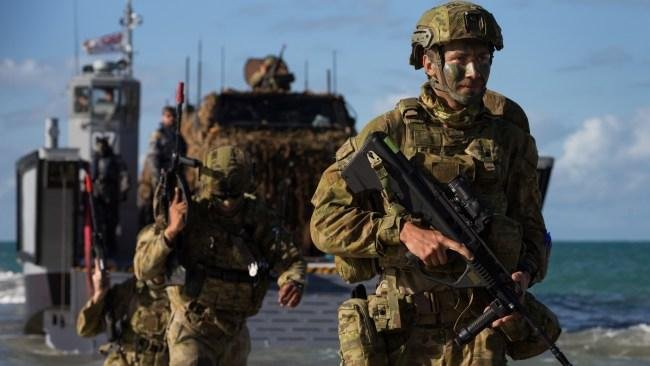
The Defence Minister has suggested the government may look to make New Zealand nationals in Australia, among citizens from a range of other countries, eligible for recruitment in the military.


The Defence Minister has suggested the government may look to make New Zealand nationals in Australia, among citizens from a range of other countries, eligible for recruitment in the military.


Enter your account data and we will send you a link to reset your password.
To use social login you have to agree with the storage and handling of your data by this website. %privacy_policy%
AcceptHere you'll find all collections you've created before.
154 comments
Defence Minister Richard Marles has touted the consideration of non-citizens as an element of the government’s commitment to widen eligibility criteria for recruits to the Australian military.
Announcing the Albanese government’s 2024 National Defence Strategy on Wednesday, Mr Marles identified workforce shortfalls in the Australian Defence Force (ADF) as a key impediment to its national security objectives and long-term capabilities.
Mr Marles highlighted his department’s plans to develop a comprehensive workforce plan targeting the improvement of both new recruitment and retention of existing staff this year, including through hiring from a wider pool of people.
“This means ensuring that Defence reflects its full diversity of Australia such that it is drawing on the talents of the entirety of Australian society,” the Minister for Defence said in an address to the National Press Club.
The Australian Defence Force is under-recruited by about 4,400 personnel as of January this year. Picture: Supplied
“But like the defence forces of our friends and allies, we also need to look at ways in which we can recruit from among certain non-Australian citizens to serve in the ADF.”
Asked by Sydney Morning Herald journalist Matthew Knott about which countries’ citizens the government would look to target, Mr Marles listed Australia’s chief intelligence allies and regional partners as the likely options.
“An obvious place to start looking is among AUKUS partners or Five Eyes partners,” he said, referring to the United States, United Kingdom, Canada, and New Zealand.
“There are 600,000 Kiwis who live in Australia right now, that is another obvious place for us to look to. We are thinking about ways in which we can involve Australia’s Pacific family more in our Defence Force work, and there is certainly an interest around the Pacific in respect of that.”
Mr Marles did not provide details on the intake frequency or personnel numbers to be sought, stressing there were several considerations about the “categories” of non-citizens eligible to join the ADF to be worked through.
Defence Minister Richard Marles announcing the 2024 National Defence Strategy on Wednesday. Picture: Supplied
“This is a Rubicon that has been crossed by the defence forces of our friends and allies. You’ll see Nepalese and Fijians serving in the British armed forces, you’ll see Micronesians serving in the US armed forces. So, it is a bridge that has been crossed by others.”
“We do have a significant workforce challenge… but it’s not just a matter of maintaining the current numbers in the force, we need to grow the force through to 2040 and to do that we need to be thinking about these avenues and this wider pool of people that we can draw from.”
As of January 2024, the ADF stands under-recruited by about 7.0 per cent – or 4,400 personnel – of its total authorised strength across the Army, Navy, and Airforce.
ADF chief General Angus Campbell conceded the shortfall in February and warned the low rates of recruit inflow were crippling sustainment of the force.
Australia will boost spending on the Defence Force by $50 billion over 10 years as the nation faces complex new threats of conflict. Picture: Supplied
Subscribe to stream on the Sky News Australia app
You can now subscribe to stream four news channels live, and watch full Sky News Australia shows on demand, with the Sky News Australia app on mobile and tablet devices.
Terms and conditions apply. Content accessible in Australia only.
“It puts stress across the entire organisation in terms of being able to both train, recruit, to conduct activity, and to sustain our people, support their families, continue our tempo of activity, both internationally and domestically,” he told a Senate Estimates hearing.
Challenges surrounding workforce shortages in the Australian military predate the incumbent Labor government by more than a decade.
Since 2022, several key initiatives to improve recruitment and retention have been introduced, including the ADF Continuation Bonus, better access to study opportunities and more health benefits.
Mr Marles’s Tuesday address to the Press Club also outlined a suite of new strategic frameworks to underpin the ADF in the coming decade, particularly large-scale investments to bolster the military’s interception capabilities to modern and evolving security threats of conflict.
Government spending on the Defence Force will be increased by $50 billion over the next 10 years.